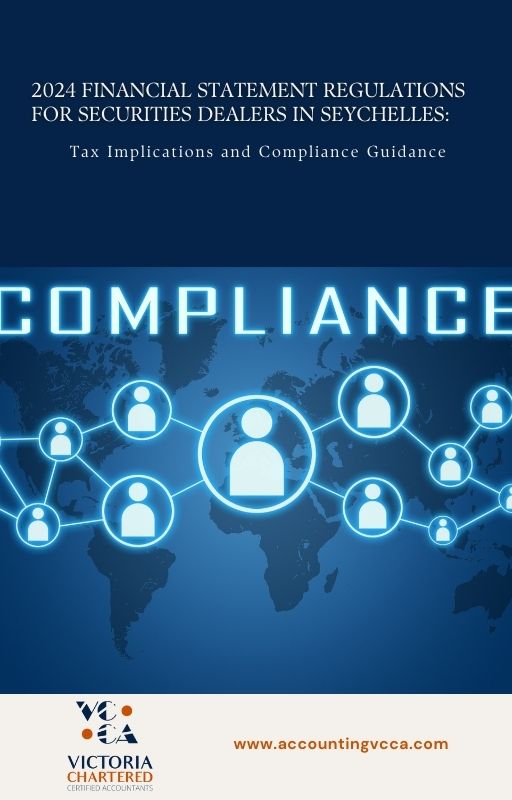One of our goals is to develop our firm as subject matter experts for capital markets players in Seychelles and to help securities dealers navigate to changes financial reporting regulations while staying tax compliant.
The Securities (Financial Statements) (Amendment) Regulations, 2024, effective 31 December 2024, introduce significant changes to the financial and operational requirements for securities dealers in Seychelles. These updates primarily impact the minimum issued and paid-up capital thresholds, which have been revised upward for most categories of securities operations, with one exception—Category (b): Investment Advisors, whose requirements remain unchanged.
This article provides an overview of the amendments, explores their tax implications, and offers practical guidance for
securities dealers to ensure compliance.
Key Changes Introduced by the 2024 Regulations
The Securities (Financial Statements) Regulations, 2008, have been amended in several ways to strengthen the financial framework for securities dealers. Key changes include:
The Securities (Financial Statements) Regulations, 2008, have been amended in several ways to strengthen the financial framework for securities dealers. Key changes include:
1. Increases in Minimum Issued and Paid-Up Capital The capital thresholds for securities dealers have been increased across various categories. Highlights include: Securities Dealers: Minimum capital increased from

- US$50,000 to US$100,000.
- Investment Advisors: Minimum Capital remains unchanged at US$50,000.
- Securities Exchange: Minimum capital increased from US$150,000 to US$200,000.
- Clearing Agency: Minimum capital increased from US$100,000 to US$150,000.
- Other Licensed Security Facility: Minimum capital increased from US$50,000 to US$100,000.
2. Capital Maintenance Requirements
The amended regulations introduce a new subregulation (2) to Regulation 20, requiring that securities dealers:
- Maintain the minimum issued and paid-up capital at all times.
- Hold the capital in a bank account: Licensed under the Financial Institutions Act, 2004, or Located in a jurisdiction approved by the FSA.

"The essence of investment management is the management of risks, not the management of returns."
Benjamin Graham Tweet
|
3. Transition Period
Tax Implications of the Revised Capital Requirements The increased capital requirements and maintenance rules carry important tax implications under Seychelles’ tax framework. Below are the key areas securities dealers should consider: 1. Business Tax Implications The Business Tax Act (Cap 20) governs how various financial transactions are taxed. The new capital requirements affect tax reporting and compliance in several ways: a. Capital Contributions Are Non-Deductible
b. Debt Financing and Interest Deductions
c. Impact on Taxable Income
|
2. Withholding Tax Implications The requirement to maintain capital in a licensed or approved bank introduces potential withholding tax obligations. a. Interest Income on Deposited Capital
b. Cross-Border Transactions
3. Economic Substance and Transfer Pricing The increased capital thresholds align with Seychelles’ broader emphasis on economic substance and compliance with transfer pricing rules. a. Economic Substance Compliance
b. Transfer Pricing Adjustments
|
4. Passive Income Taxation Under the Business Tax Act, any passive income (e.g., interest earned on capital deposits) is taxable. Securities dealers must:
5. VAT and Input Tax Credits Although the capital itself is not subject to VAT, securities dealers must consider the following: a. VAT on Related Expenditures
b. VAT on Financial Services Securities dealers providing exempt financial services (e.g., securities trading) under the VAT Act, 2010 must evaluate VAT implications on non-exempt supplies. Practical Steps to Manage Compliance To navigate the regulatory and tax implications of the 2024 amendments, securities dealers should take the following steps: 1. Assess Capital and Banking Arrangements
2. Plan for the Transition Period
3. Strengthen Financial Reporting
4. Ensure Economic Substance
|

5. Monitor Withholding Tax and DTAs
6. Seek Professional Advice
Conclusion: Proactive Planning is Key The Securities (Financial Statements) (Amendment) Regulations, 2024, reflect Seychelles’ commitment to building a resilient and transparent financial system. While the increased capital requirements strengthen the financial foundation for securities dealers, they also introduce new tax compliance challenges. By understanding the tax implications and taking proactive steps, securities dealers can ensure compliance while optimizing their taxes. |








